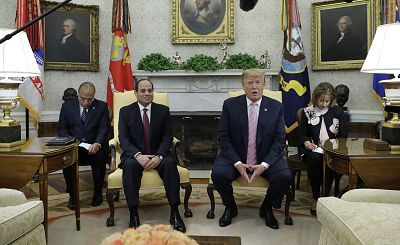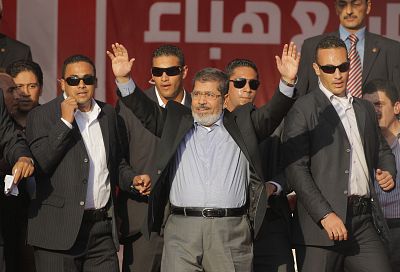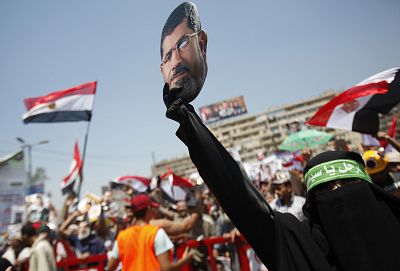"There is not a single American expert on the Muslim Brotherhood who supports designating them" as a terrorist organization, one expert said.
White House officials are weighing whether to designate the Muslim Brotherhood a foreign terrorist organization — a move experts warn would make the United States less safe and end up victimizing American Muslims to curry favor with authoritarian allies.
The New York Timeson Tuesday reported that the administration was pushing to do this after Donald Trump met with Egyptian strongman Abdel-Fattah el-Sissi. White House press secretary Sarah Sanders later confirmed the president was consulting with advisers and foreign leaders on the move.
That's a bad idea, warn U.S. experts in Middle East politics and security. To start with, they say, cracking down on the Brotherhood would put unfair pressure on Muslims in the U.S., the vast majority of whom are not members.
According to Shadi Hamid, a senior fellow at the Center for Middle East Policy at the Brookings Institution, a Washington think tank, the move would empower dangerous theories that describe Islam as antithetical to U.S. culture.
"You have this kind of conspiracy theory that different U.S. Muslim organizations have ties to the Muslim Brotherhood. So I think a real concern here is this designation is also a smokescreen to essentially attack the American Muslim community through guilt by association," he said in a video. "Then you really get into this slippery slope of the American Muslim community being guilty until proven innocent."
The designation would also allow American authorities to "go after" Muslim organizations in the U.S., said Michele Dunne, a senior fellow and the director of the Middle East Program at the Carnegie Endowment for International Peace.
That's because in many countries, the Muslim Brotherhood specifically has a diffuse, international network that openly runs a "huge" array of hospitals, kindergartens, schools and other charities, she said.
"It is very normal for them to be fundraising among the well-heeled Muslim immigrants abroad," Dunne added. "Not for terrorism, for legitimate charitable work."
And targeting Muslims in the U.S. for links to Islamic charities abroad would undermine the premise that American officials do not discriminate against Muslims, who make up less that 2 percent of the population.
"It has been one of the good arguments that the United States made that we're only against terrorism ... we're not against Islam," Dunne said. "If this designation is passed and if it is at all implemented, that is going to put Muslims in the United States under a great deal of pressure."
To meet legal criteria as a foreign terrorist organization, a group must engage in terrorist activity that threatens the security of Americans or the defense, foreign relations or economic interests of the United States.
And the Muslim Brotherhood does not fit this criteria, according to Brookings' Hamid.
"The Muslim Brotherhood is not a terrorist organization," he said. "There is not a single American expert on the Muslim Brotherhood who supports designating them" as such.
While it doesn't make sense from a terror-fighting perspective, the designation would see the U.S. doing the dirty work for foreign autocrats, said Ned Price, a former CIA officer and former National Security Council official.
A prime example of this would be Egypt's Sissi, who came to power in 2014 after removing predecessor Mohammed Morsi, who himself came from the Muslim Brotherhood. Sissi has violently cracked down on the group and classified it a terrorist organization. The Brotherhood denies any involvement in attacks there.
The "vast majority" of branches of the Muslim Brotherhood — which was founded in 1928 in Egypt and now operates in many countries — do not espouse violence, said Price, a fellow at the New America Foundation and NBC News analyst.
"You see the Egyptians and the Saudis and Emiratis putting a target on the backs of this group … not because of security concerns, but because of political concerns," he said. "It is a sign that this administration is far from being on the side of the persecuted and marginalized — it is actually doing the persecuting and marginalizing on the global level."
Saudi Arabia, the United Arab Emirates and Egypt are also fighting to counter the influence of rivals Turkey and Qatar in the region, which are financing and offering safe havens for the movement's leaders.
That is not to say that branches of the group haven't carried out terrorist attacks — they have. One example is Hamas, the Palestinian militant organization that runs the Gaza Strip and which the U.S. already designates as a terrorist group. Other members have quit the Muslim Brotherhood and joined terror groups after growing tired of its nonviolent stance.
But most Brotherhood groups have also gone to great lengths to distance themselves from the likes of Al Qaeda and the Islamic State group, Price added.
"If we were to designate the group whole cloth, we would essentially be isolating ourselves from governments in Tunisia, in Jordan, in Morocco and Turkey," he said, mentioning countries where the Muslim Brotherhood participates in mainstream politics.
The designation would also most likely end up being a propaganda win for actual terrorist groups such as ISIS and Al Qaeda, according to Brookings' Hamid.
These groups' message is "basically that change is not possible within the political process, that democracy does not work because Islamists like the Brotherhood … will never be allowed to participate," he said. "ISIS uses that to say that the only way is to use brute force and violence to get what you want."
Days before he was murdered in the Saudi Arabian consulate in Istanbul, Washington Post columnist Jamal Khashoggi also made an impassioned argument for the U.S. not to marginalize the Muslim Brotherhood and other Islamists.
"There can be no political reform and democracy in any Arab country without accepting that political Islam is a part of it," he wrote. "It seems clear then that the only way to prevent political Islam from playing a role in Arab politics is to abolish democracy, which essentially deprives citizens of their basic right to choose their political representatives."














